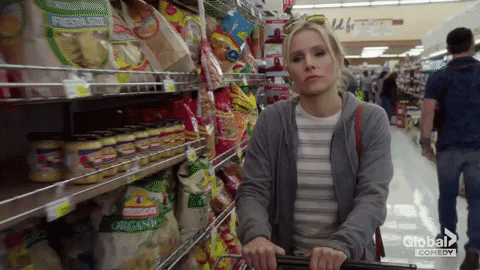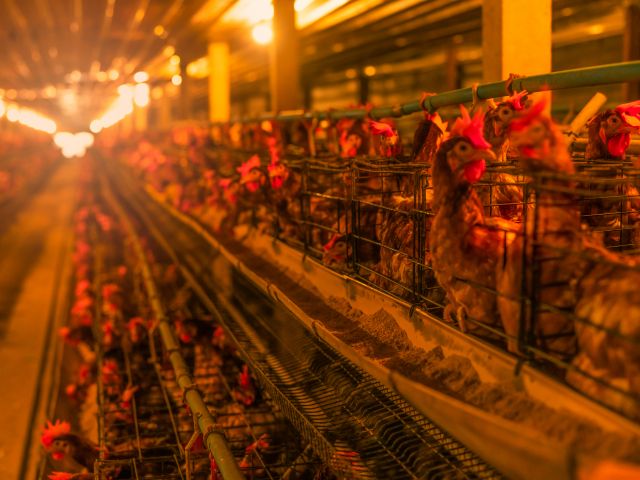Did you start buying groceries online during the pandemic? Mie and Jessica know why

Coronavirus disrupted both our grocery shopping behavior and the entire industry, a CBS master's thesis shows. The two thesis writers and their supervisor expect our behavior has changed for good.
You probably remember the pictures of crowded supermarkets in the days following Mette Frederiksen’s lockdown speech on March 11, 2020. Maybe you were in the crowd yourself? Squirrelling away toilet paper, canned tomatoes, pasta and chocolate like there was no tomorrow.
After some hectic days with multiple reassurances that we would not run out of food and everyday necessities, the lines shortened and people went back to more normal shopping behavior. Or did they?
Mie Lundegaard Berg and Jessica Yu, both recent CBS graduates, have just defended their master’s thesis, which explores exactly how the pandemic has changed our grocery-shopping behavior.

Mie Lundegaard Berg works at Coop Denmark, so they have used sales data from Coop’s physical and online stores for reference in their thesis, and just one glance at the annual report reveals the disruption coronavirus has imposed.
“Firstly, we saw significant growth in Danish consumers’ grocery spending. Both physical and online channels of Coop had a noticeable positive revenue growth in 2020,” says Jessica Yu.
Mie Lundegaard Berg continues:
“Based on available data, food related categories in the online grocery market increased by around 70 %. The growth in the physical stores is worth DKK 2 billion, which is a very large increase, especially in this market. If we look at the annual reports from the past five years, the market was actually decreasing by 2% a year, so a 6% increase for physical stores is a lot,” she says.
I think people will blend their shopping behavior to suit their lifestyles
Jessica Yu
Mie Lundegaard Berg explains that as people were sent home, the consumption increased.
“Suddenly, people who perhaps normally lunched at their workplaces had to buy extra groceries for that, as well as drinking more coffee at home. And since no one could spend money at bars or restaurants, they might as well spend that part of their budgets on buying better and more groceries,” she says.
But buying more was not the only change.
Social distancing online
For their master’s thesis, Jessica Yu and Mie Lundegaard Berg set up a framework consisting of five predetermined factors to analyze peoples’ grocery shopping behavior. More specifically, they wanted to know whether the pandemic had pushed more consumers to buy their groceries online and have them delivered, instead of going to the physical store.
“The most important reason behind the change is related to social interaction. Online shopping is very ‘cold’, as you talk to no one, but with the pandemic, people were being careful and social distancing. Naturally, that was the most fundamental reason for people moving to online shopping,” says Jessica Yu.
Not only did the two thesis writers use Coop’s sales data to support their findings, but they also conducted six in-depth interviews with different types of grocery shoppers about their thoughts and shopping behavior during the pandemic.
For example, the need for quality checking products in the physical stores also decreased with the pandemic.
“Because of the risk of other people’s bacteria being on the products, some of the interviewees pointed out that they would rather their groceries were packed by employees to minimize the risk of having other customers touching the groceries,” says Jessica Yu.
Price sensitivity and cherry picking fruit
As the pandemic began, the media described hour-long queueing for online supermarkets. More than 40,000 would be queuing up online at the same time to avoid visiting physical stores.
The advantages of avoiding physical supermarkets exceeded the disadvantages, which included groceries being slightly more expensive through the online platforms, as consumers had to pay for delivery and sometimes higher product price.
“Before coronavirus, price sensitivity was a major barrier to consumers wanting to move their shopping online. They perceived it as more expensive, but with coronavirus, that barrier was overridden. It was more important to feel safe and pay a little more for the groceries,” explains Mie Lundegaard Berg.
Jessica Yu adds:
“We talked to a senior citizen who explained that buying groceries online was a form of service rather than getting the product itself. Two other interviewees, on the other hand, were not scared of contracting the virus, but they moved their shopping online because they were scared of spreading the virus. That was an interesting insight,” she says.
Although the two thesis writers never moved their own shopping online, they changed their behavior. Especially after conducting interviews for their thesis.
“I live above a grocery store, so it wouldn’t make sense for me. Also, we are students, so we are quite price sensitive. But as I was studying and working from home, I could go shopping at odd hours to avoid the crowds,” says Mie Lundegaard Berg.

For Jessica Yu, one interview made her think more carefully about certain aspects of her behavior when shopping in physical stores.
“One mentioned that she was aware that you cannot start digging for fruit and products. That you have to pick the one you’ve touched. I didn’t think about that too much prior to the interviews, but I became very aware of it,” she says.
Online vs offline shopping
Edlira Shehu, Associate Professor at the Department of Marketing and thesis supervisor, explains that although she expected more people to move their shopping online, it is important and relevant to have the facts and evidence to support the assumptions.
“This thesis is very timely and relevant. By using real world data, we can quantify the sales effects, and with the knowledge now available, we can consider this behavior in the future market. No one can know what life has in store, but now they know what happens during a lockdown and how to manage both online and offline stores to suit the behavior,” she says.
Although the students have interviewed only six people, Edlira Shehu points out that in-depth interviews are better than standardized surveys to analyze this topic.
“Based on the sales data, the companies don’t know about the consumers’ motives for shopping online rather than in physical stores. When it comes to learning about consumers’ motives, feelings and perceptions, interviews are quite important, especially for sensitive topics, such as the pandemic situation. So having interviews adds significant value, more than if you conducted a survey where people just answer yes, no and maybe,” she says.
Edlira Shehu has performed research on online shopping behavior and multichannel retailing and believes that the pandemic has changed how people perceive their grocery shopping.
“It’s difficult to predict the future based on a one-time event, but what we know from previous studies is that if people have passed the barriers of online shopping, and become used to having purchases delivered and seeing the positive aspects, it’s likely that they will continue to do so. Perhaps some will return to shopping in stores because they missed it, but others will continue using the online channel also in future,” she says.
Both Mie Lundegaard Berg and Jessica Yu also believes that a new normal will emerge and that grocery shopping will become multifaceted.
“I think people will blend their shopping behavior to suit their lifestyles. Maybe they will want to buy heavy, long-lasting and bulky groceries online and have them delivered, like beer and beverages, but will continue to visit physical stores for milk, bread and dairy products,” says Jessica Yu.






































































































































Comments